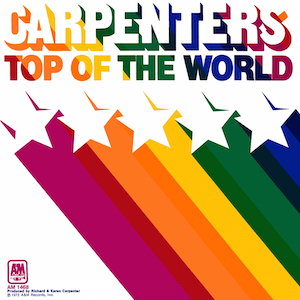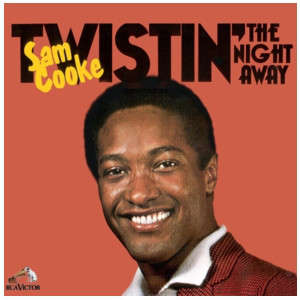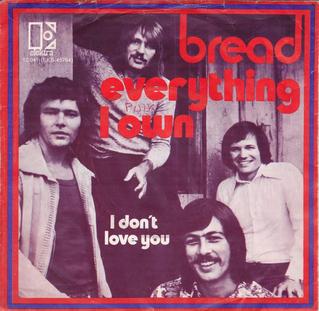
"Dream Weaver" is a song by the American singer Gary Wright, released as the first single from his third studio album The Dream Weaver in December 1975.

"I Write the Songs" is a popular song written by Bruce Johnston in 1975 and released on his album Going Public in 1977. Barry Manilow's version reached number one on the Billboard Hot 100 chart in January 1976 after spending two weeks atop the Billboard adult contemporary chart in December 1975. It won a Grammy Award for Song of the Year and was nominated for Record of the Year in 1977. Billboard ranked it as the No. 13 song of 1976.
Stories was an American early 1970s rock and pop music band based in New York. The band consisted of keyboardist Michael Brown, bassist/vocalist Ian Lloyd, guitarist Steve Love, and drummer Bryan Madey, and had a Number 1 hit with a cover of Hot Chocolate's "Brother Louie."

"Top of the World" is a 1972 song written and composed by Richard Carpenter and John Bettis and first recorded by American pop duo Carpenters. It was a Billboard Hot 100 No. 1 hit for the duo for two consecutive weeks in 1973.

"Until You Come Back to Me (That's What I'm Gonna Do)" is a song written by Morris Broadnax, Clarence Paul, and Stevie Wonder. The song was originally recorded by Stevie Wonder in 1967, but his version was not released as a single and did not appear on an album until 1977's anthology Looking Back. The best-known version of this song is the 1973 release by Aretha Franklin, who had a million-selling top 10 hit on Billboard charts. The song reached No. 1 on the R&B chart and No. 3 on the Hot 100 chart in 1974. It became an RIAA Gold record.

"Laughter in the Rain" is a song composed and recorded by Neil Sedaka, with lyrics by Phil Cody. It includes a 20-second saxophone solo by Jim Horn. The song hit No. 1 on the Billboard Hot 100 in February 1975.

"Twistin' the Night Away" is a song written and recorded by Sam Cooke. It was recorded on 18 December 1961 and released as a single in 1962. It became very popular, charting in the top ten of both the Billboard Hot 100 (#9) and Billboard's R&B chart (#1). "Twistin' the Night Away" was successful overseas as well, peaking at #6 on the UK Singles Chart.

"Let It Be Me" is a popular song originally published in French in 1955 as "Je t'appartiens" interpreted by Gilbert Bécaud. It became popular worldwide with an English version by the Everly Brothers and later with the duet by Betty Everett and Jerry Butler.

"Everything I Own" is a song written by American singer-songwriter David Gates. It was originally recorded by Gates's soft rock band Bread for their 1972 album Baby I'm-a Want You. The original reached No. 5 on the American Billboard Hot 100. Billboard ranked it as the No. 52 song for 1972. "Everything I Own" also reached No. 5 in Canada and No. 12 in Australia.

"Summer Breeze" is a 1972 song by American soft rock duo Seals and Crofts. It is the title track of their fourth studio album, and was released as the album's lead single in August 1972. The song reached No. 6 on the US Billboard Hot 100 chart in the US. In 2013, it was ranked No. 13 in Rolling Stone′s "Best Summer Songs of All Time". The song also became a hit for the Isley Brothers in 1974.

"Show and Tell" is a popular song written by Jerry Fuller and first recorded by Johnny Mathis in 1972. This original version made it to #36 on the Easy Listening chart.

"Take Me in Your Arms (Rock Me a Little While)" is a song written by the premier Motown songwriting/production team of the 1960s Holland–Dozier–Holland. The first hit recording was sung by Kim Weston in 1965. It was most popular in 1975 when it was recorded by the Doobie Brothers.

"I Just Want to Be Your Everything" is a song recorded by Andy Gibb, initially released in April 1977 as the first single from his debut album Flowing Rivers. It reached number 1 on the Billboard Hot 100 for three weeks, starting on the week ending 30 July 1977, and again for the week ending 17 September 1977. It was Gibb's first single released in the United Kingdom and United States. His previous single, "Words and Music" was only released in Australia. It is ranked number 26 on Billboard's 55th anniversary All Time Top 100.

"Rock On" is a song written by English singer David Essex. Recorded in 1973 and released as a single by Essex, it became an international hit. In 1989, American actor and singer Michael Damian recorded a cover version that went to number one on the Billboard Hot 100 chart. The song has been recorded many times, including a 2006 version by the English hard rock group Def Leppard.

"I'm Leaving It Up to You" is a song written by and originally performed by Don Harris and Dewey Terry in 1957. It was later popularized in 1963 by the American duo Dale and Grace, who took it to #1 on the Billboard Hot 100 chart. In 1974, Donny and Marie Osmond reached the top five on the US Hot 100 chart and peaked at #1 on the Billboard Hot Adult Contemporary chart with their cover.

"I'm Gonna Love You Just a Little More Baby" is a song written, produced and recorded by Barry White.

"Never My Love" is a pop standard written by American siblings Don and Dick Addrisi, and best known from a hit 1967 recording by the Association. The Addrisi Brothers had two Top 40 hits as recording artists, but their biggest success as songwriters was "Never My Love". Recorded by dozens of notable artists in the decades since, in 1999 the music publishing rights organization Broadcast Music, Inc. (BMI) announced it was the second most-played song on radio and television of the 20th century in the U.S.

"Everybody Plays the Fool" is a 1972 song first recorded by American R&B group The Main Ingredient, and written by J. R. Bailey, Rudy Clark and Ken Williams. It was the first single released from the group's album Bitter Sweet, released with the B-side "Who Can I Turn To ". "Everybody Plays the Fool" was the group's highest charting hit single, reaching No. 3 on the Billboard Hot 100 chart in the fall of 1972. It also peaked at No. 2 on the Billboard R&B chart and at No. 25 on the Billboard adult contemporary chart. It was certified gold by the RIAA.

Paul Revere & the Raiders are an American rock band from Boise, Idaho. Formed in 1958, the band released their first hit single three years later, "Like, Long Hair", which reached number 38 on the U.S. Billboard Hot 100 chart. Following a few minor charting singles, including a version of "Louie Louie", the band worked with producer Terry Melcher in updating their sound, combining fast-paced, guitar-and-vocal-dominated rock and roll with an intimidating R&B flavor. The result was a string of commercially successful singles, beginning with 1965's "Steppin' Out" and continuing with "Just Like Me", which reached number 11 on the Hot 100, as well as "Kicks", "Hungry", and "Good Thing", all of which peaked inside the top 10. In addition, the band's three 1966 studio albums—Just Like Us!, Midnight Ride, and The Spirit of '67—were each certified gold in the United States.

"Chick-A-Boom " is a song written by Janice Lee Gwin and Linda Martin and performed by Daddy Dewdrop. It was featured on his 1971 album, Daddy Dewdrop. The lyrics in the verses are spoken, rather than sung.




















